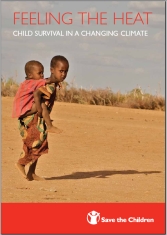In a new report on the impact of climate change on children, Save the Children has identified social protection in the form of cash grants to poor and vulnerable people as a key way to help communities cope and adapt.
The report, called Feeling the Heat, was released on Thursday Nov 5 at the Barcelona Climate Change talks.
According to the report, up to 175 million children a year will be hit by natural disasters linked to climate change. The researchers warn that climate change will “exacerbate the leading causes of death of children, including diarrhea, maluntrition and malaria.”
Feeling the Heat argues that plans to adapt to climate change must take into account the specific needs of children. This includes the need to boost health, water and sanitation systems in the poorest countries. Early warning systems for disasters are also crucial, the report says.
Emergency safety needs and long-term social protection in the form of cash transfers, are named as critical measures to help people cope with shocks and to reduce child mortality. Such measures should be specifically aimed at assisting children under five and pregnant and lactating mothers, the report says, as these “have the potential to tackle malnutrition brought about by climate change.”
You can download the full report here.
Focus on women to fight hunger
In an article on NGO Pulse, Charlotte Sutherland argues that efforts to fight hunger should focus on women – and that we need to move away from food aid, to enabling poor and vulnerable people to produce more of their own food.
Sutherland, a research manager at Consultancy Africa Intelligence, argues that women are a good starting point for food production initiatives because they tend to put their families ahead of themselves.
Focusing on the role of women, Sutherland argues that communities need help with a range of measures to give communities the tools to “tackle disasters before they strike.” this includes building of wells, irrigation programmes, and stockpiles of food and medicine. Just as crucial, is ensuring that women have secure land and property rights. This in turn would help women to access credit, technical input, training and education.


